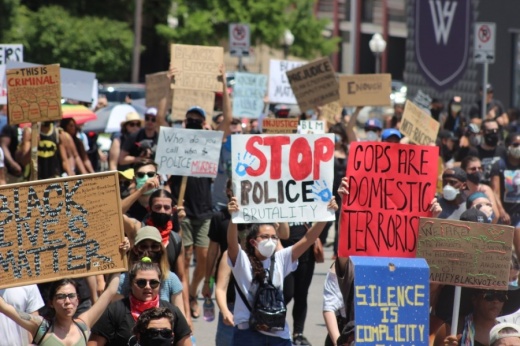The four resolutions, drafted by District 1 Council Member Natasha Harper-Madison, City Council’s lone Black representative, garnered unanimous support from the dais. All four are meant to continue the citywide reckoning over Austin’s history of institutional racism and inequity.
“The city of Austin turned 181 years old this year. ... Since then, we’ve had slavery, the KKK, Jim Crow, segregation, ... racial violence, disinvestment, displacement and the distinction of being the only fast-growing U.S. metropolitan city with a shrinking Black population,” Harper-Madison said. “The inequities are countless, and they aren’t because African Americans are inherently inferior. ... Most of the time, explicit racism is no longer accepted in polite society. That doesn’t mean the job is done.”
None of the resolutions changed laws; rather, they directed City Manager Spencer Cronk and city staff to formalize proposals that fulfill the requests and to come back to City Council for a vote or to provide an update.
At the top of the requests was solidifying the June 19 holiday, Juneteenth, as an official, paid holiday for Austin city employees. The holiday marks the day in 1865 when Union soldiers docked in Galveston, Texas, with the news that the Civil War was over and enslaved people were free. The news reached Texas months after the Civil War officially concluded and more than two years after President Abraham Lincoln issued the Emancipation Proclamation in 1863.
Juneteenth is celebrated in communities throughout the city, and although it is recognized by the state as an official holiday, Austin has never formalized its recognition of the date. City Council directed Cronk to come back before budget adoption Aug. 12 with an analysis on how he would implement the new paid holiday for city staff.
Cronk will also be drafting an ordinance amendment that lifts what City Council deemed inequitable prohibitions on public consumption of alcohol that the city has recognized only in specific neighborhoods since the 1990s.
The three areas west of I-35 that do not allow public consumption surround the central business district and entertainment districts downtown; The University of Texas campus, where there is a large concentration of minors; and environmentally sensitive areas along Lady Bird Lake and Bouldin Creek. The three areas east of I-35, an area of town mired in a history of racial segregation, are in the Riverside and Montopolis neighborhoods and in a sprawling section of Central East Austin that extends from Holly Street and I-35 up to Airport Boulevard and 13th Street.
Unlike the restricted areas west of I-35, those on the east side have significant populations of single-family neighborhoods.
After changing a pair of street names in 2018 named after Confederate soldiers Robert E. Lee and Jefferson Davis, the city will again be looking at all city assets that bear the names of Confederates or known white supremacists following approval from City Council.
In 2018, the city’s equity office provided a list of 34 such city assets, from street to monuments. That list included the city’s own namesake, Stephen F. Austin, who the office said “fought to defend slavery.”
Harper-Madison’s office has not commented on whether changing the city’s name is an effort council wishes to pursue; however, her language in the resolution states that “it is the stated goal of the Austin City Council to rename all city assets dedicated to the Confederacy and white supremacy.”
Cronk will have to choose five or six city assets to tackle each six-month period beginning Sept. 1, per meeting documents.
“The city manager is directed to report on the educational content delivered, public opinions voiced, and alternate names proposed for each cohort within one month of completing the cohort’s process,” the resolution reads. “The city manager is directed to repeat this process until every city asset latent with Confederate and white supremacist history has gone through it.”
City Council also deemed racism a public health crisis and further directed city staff to work to combat racial inequities within the city's own governing structure and throughout the community. The resolution drummed up the recommendations of Mayor Steve Adler’s 2017 Task Force on Institutional Racism and Systemic Inequities and asked city staff to prioritize recommendations that can assist communities of color.





